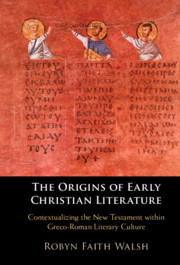Crossref Citations
This Book has been
cited by the following publications. This list is generated based on data provided by Crossref.
Newton, Richard
2021.
Hebrew, Hebrews, Hubris?: Diagnosing Race and Religion in the Time of COVID-19.
Religions,
Vol. 12,
Issue. 11,
p.
1020.
2021.
Books Received 71.2.
The Classical Review,
Vol. 71,
Issue. 2,
p.
599.
Ballentine, Debra Scoggins
2022.
Theorizing Myth to Facilitate Comparison and Re-Description in Biblical Studies.
Religions,
Vol. 13,
Issue. 9,
p.
767.
Hansen, Christopher M.
2022.
Re-examining the Pre-Christian Jesus.
Journal of Early Christian History,
Vol. 12,
Issue. 2,
p.
17.
Brewer, Eric J.
2023.
Editorial fatigue and the relationship between 2 Kings 18–20 and Isaiah 36–39.
Journal for the Study of the Old Testament,
Vol. 48,
Issue. 2,
p.
192.
Paley, Justin P.
2023.
Pauline Pseudepigrapha and Early Christian Literacy: Are the Clues Hidden Right in Front of US?.
Religions,
Vol. 14,
Issue. 4,
p.
530.
Byers, Andrew J.
2023.
The Genre of Mark’s Gospel Is ‘Gospel’: Reconsidering Literary Innovation in the Markan Incipit.
Journal for the Study of the New Testament,
Vol. 46,
Issue. 2,
p.
168.
Kirk, Alan
2023.
The ‘Galilean Q Community’ and the Orientalist Legacy in 2DH Scholarship.
Journal for the Study of the New Testament,
Vol. 46,
Issue. 2,
p.
216.
Oliveira, Nycholas Lawrence David
and
Kok, Jacobus (Kobus)
2023.
Codex and Contest: What an Early Christian Manuscript Reveals about Social Identity Formation Amid Persecution and Competing Christianities.
Religions,
Vol. 15,
Issue. 1,
p.
44.
Newton, Ritchard
2023.
Revisiting scriptures: Unbinding a critical comparative subfield.
Religion Compass,
Vol. 17,
Issue. 12,
Reed, Lily R.
2023.
Was the Woman with the Flow of Blood Drunk? An Exploration of the Possibility that She Was Viewed as an Anus Ebria.
Journal for the Study of the New Testament,
Vol. 46,
Issue. 2,
p.
150.
Monroe, M Willis
2023.
On the Category ofReligion: A Taxonomic Analysis of a Large-Scale Database.
Journal of the American Academy of Religion,
Vol. 91,
Issue. 2,
p.
257.
Eberhart, Zechariah Preston
2023.
Shifting Gears or Splitting Hairs? Performance Criticism’s Object of Study.
Religions,
Vol. 14,
Issue. 9,
p.
1110.
Andrejevs, Olegs
2023.
KΛINH / KΛINIΔION: A Note on Two Minor Agreements (Mt 9.2, 6 / Lk 5.18, 24).
Journal for the Study of the New Testament,
Vol. 46,
Issue. 1,
p.
59.
Trax, Kenneth
2023.
Happy Reading: Textual Self-Consciousness and Human Flourishing in the Macarisms of Lk 11.28, Gos. Thom. 79.2, and Rev. 1.3.
Journal for the Study of the New Testament,
Vol. 45,
Issue. 3,
p.
304.
Cardozo Mindiola, Cristian Daniel
2024.
“If You Can Change Your Name, You Can Write”: Pseudepigraphy in Antiquity and Its Function in 1 Apocryphal Apocalypse of John.
Religions,
Vol. 15,
Issue. 5,
p.
539.
Peralta, Dan-el Padilla
2024.
Freed Persons in the Roman World.
p.
242.
De Cock, Miriam
2024.
Narrating ‘Home’ in Early Christian Biography: Athanasius’ Life of Antony and Its Literary Predecessors.
Religions,
Vol. 15,
Issue. 11,
p.
1375.
Bonar, Chance E.
2025.
The Author in Early Christian Literature.
Hagerman, Justin
2025.
Social Fractures in the Habitus: Paul’s κατάρτισ- Language of Preventative and Responsive Care.
Journal for the Study of the New Testament,



